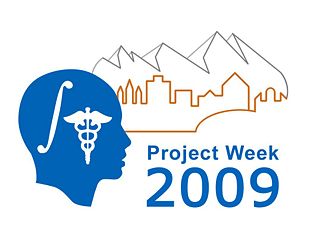Difference between revisions of "2009 Winter Project Week Slicer VMTK"
(New page: {| |thumb|320px|Return to [[2009_Winter_Project_Week|Project Week Main Page ]] |} __NOTOC__ ===Key Investigators=== * Daniel Haehn (Student of M...) |
|||
| Line 24: | Line 24: | ||
<h1>Approach, Plan</h1> | <h1>Approach, Plan</h1> | ||
| − | VMTK provides Python pipeable scripts (PypeS) to connect various commands and/or scripts. The plan is to | + | VMTK provides Python pipeable scripts (PypeS) to connect various commands and/or scripts. An automated mechanism to generate non-interactive Slicer modules has already been implemented. |
| + | |||
| + | The plan is to write a python scripted module for Slicer3 that connects to VMTK pipes and provides the same user interaction style found in VMTK. | ||
| + | This is necessary for interactive segmentation. | ||
| + | |||
| + | In addition, a collection of non-interactive modules relevant to segmentation and characterization of vascular networks will be generated. | ||
| + | |||
| + | Finally, Slicer-vmtk packaging issues will be tackled. | ||
| + | |||
</div> | </div> | ||
Revision as of 19:31, 10 December 2008
Home < 2009 Winter Project Week Slicer VMTK Return to Project Week Main Page |
Key Investigators
- Daniel Haehn (Student of Medical Informatics, University of Heidelberg)
- Luca Antiga, PhD (Medical Imaging Unit, Biomedical Engineering Department, Mario Negri Institute)
Objective
The Vascular Modeling Toolkit (VMTK) is a collection of libraries and tools for 3D reconstruction, geometric analysis, mesh generation and surface data analysis for image-based modeling of blood vessels. It should be very interesting to offer such techniques in Slicer3.
Approach, Plan
VMTK provides Python pipeable scripts (PypeS) to connect various commands and/or scripts. An automated mechanism to generate non-interactive Slicer modules has already been implemented.
The plan is to write a python scripted module for Slicer3 that connects to VMTK pipes and provides the same user interaction style found in VMTK. This is necessary for interactive segmentation.
In addition, a collection of non-interactive modules relevant to segmentation and characterization of vascular networks will be generated.
Finally, Slicer-vmtk packaging issues will be tackled.
Progress
For preparation:
- ground work for making an interactive python scripted module
- playing with VMTK pypes to generate some CLI VMTK scripts